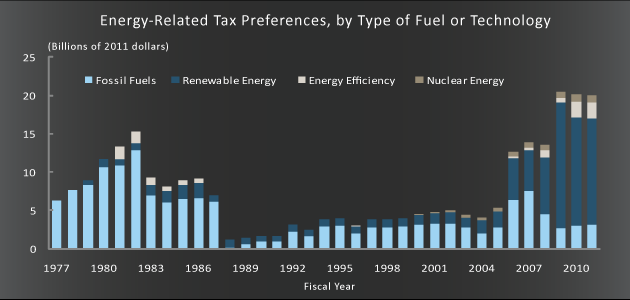587 item(s) were returned.
Last year, some U.S.-based solar manufacturers filed a complaint, leading the U.S. Commerce Department to conclude that Chinese solar panel manufacturers received unfair subsidies from the Chinese government. Consequently, Chinese solar products were priced artificially low, giving them a competitive advantage in the global market. To address this issue, the U.S. government will be imposing a tariff on Chinese solar products ranging from 2.9% to 4.37%. The aim is to increase the prices of these products and create a fairer market for U.S. manufacturers. In here, it is worth noting that the implementation of tariffs may have an impact on… [more]
View InsightIn a response to a New York Times ‘Room for Debate’ forum on energy efficiency, Cato Institute scholar Peter Van Doren argues that energy efficiency standards are problematic, and that the most effective way to reduce fossil fuel use is to tax fossil fuels to increase their price. Van Doren writes “if fossil fuel combustion produces byproducts that cause negative health effects on third parties as well as changes in the temperature of the atmosphere, the obvious lesson from economics is to increase fossil fuel prices enough through taxation to account for these effects. Then firms and consumers will react… [more]
View InsightA recent Congressional Research Service report titled “Rising Gasoline Prices 2012” states that Congress has “limited short term options … to address gasoline prices.” The report identifies six short-run policy options – a Strategic Petroleum Reserve release, a gasoline tax holiday, relaxed fuel specifications, limits on refined gasoline exports, limits on commodities speculation, and diplomatic measures – and concludes that it is unclear “what the price impact of these short term options would be” and that they would involve policy tradeoffs which may include “national security, fiscal, and health priorities.” The report briefly addresses longer-term policy options, i.e. “measures that… [more]
View InsightLast week The Economist called attention to growing demand for rare earth minerals, their importance in clean energy technologies, and rising tension over their global supply. Two of these minerals – dysprosium and neodymium – are essential components of the magnets used in wind turbines and electric motors. According to The Economist, for these technologies to play the role expected of them in reducing CO2 emissions, world supply of neodymium and dysprosium would need to increase “more than 700% and 2,600% respectively during the next 25 years.” China, which produces around 90% of the world’s rare earth minerals, has recently… [more]
View InsightOn March 13th, C2ES held a panel discussion in Washington, DC titled “Electric Vehicles Plugging into the U.S. Grid.” The panel addressed the opportunities and challenges surrounding broad roll-out of plug-in electric vehicles (PEVs). A key point of discussion was the need for harmonization between the auto industry, utilities, and government so as to optimize the electric grid as PEVs become a larger proportion of the vehicle fleet. Another key point was the need for consumers that are well-educated on PEVs. What’s keeping PEVs, and other alternative fuel cars, from breaking into the market? Is it simply a lack of… [more]
View InsightA recent report from the Congressional Budget Office found that in 2011 federal support for fuel and energy technology development and production was $24 billion. Of this, $20.5 billion, or 85%, was in the form of “tax preferences—such as special deductions, special tax rates, tax credits, and grants in lieu of tax credits”; the remainder was made up by the Department of Energy’s spending programs. Of the total $24 billion provided in 2011, about $16 billion, or 78%, went toward support of renewables, energy efficiency, and alternative vehicles. According to the report, historically energy-related tax preference support was “primarily… [more]
View InsightA paper by researchers at the University of Alberta, Edmonton found that the impact of Canadian oil sands mining, and subsequent land restoration, on carbon release has been significantly underestimated. This is due to the mining process’s destruction of peatland – bogs, swamps, etc. that host partially decayed organic matter – which, when destroyed, releases high levels of carbon. From the paper’s abstract in the Proceedings of the National Academies of Science: “We quantified the wholesale transformation of the boreal landscape by open-pit oil sands mining in Alberta, Canada to evaluate its effect on carbon storage and sequestration. Contrary to… [more]
View InsightMarch 11th, 2012 marked the one-year anniversary of a severe earthquake and tsunami off the coast of Japan. This natural disaster killed 20,000 people, and led to the crisis at the Fukushima Daiichi nuclear power facility. The anniversary offered a chance to reflect on the events surrounding the nuclear crisis, and responses to it in Japan and around the world. In a New York Times op-ed, Richard Brodsky sees the Fukushima crisis as an opportunity to reform the U.S. Nuclear Regulatory Commission. “In order for nuclear power to play a significant role in our energy future, the American public needs… [more]
View InsightOn March 5th, 68 Congressional Democrats sent a letter to regulators at the Commodities Futures Trading Commission (CFTC) urging that the agency “immediately enact strong position limits to eliminate excessive oil speculation as required by the Dodd-Frank Wall Street Reform and Consumer Protection Act of 2010.” The Dodd-Frank Act requires that the CFTC promulgate and enforce limits on oil speculation by January 17, 2011, but the CFTC has not yet done so. According to a Goldman Sachs report cited by the letter, “excessive oil speculation ‘translates out into a premium for gasoline at the pump of $.56 a gallon’”. Despite… [more]
View InsightH.R. 2842, the Bureau of Reclamation Small Conduit Hydropower Development and Rural Jobs Act of 2011, has been referred to the House of Representatives. The bill, introduced by Rep. Scott Tipton (R-CO), would call on the Bureau of Reclamation to develop small conduit hydropower at Bureau facilities. The bill would require that power privilege leases be offered to local irrigation districts or water users associations. The bill would prohibit altering existing water management and altering existing small conduit projects or outlays. “At a time when our country needs to focus on domestic energy production and job creation, hydropower can play… [more]
View Insight

